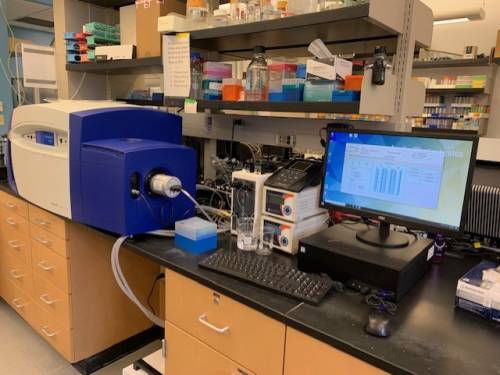Faculty in the University of Missouri College of Agriculture, Food and Natural Resources (CAFNR) Department of Biochemistry recently received a National Institutes of Health (NIH) grant to bring a state-of-the-art instrument to the MU campus – a Chirascan V100 circular dichroism (CD) spectrometer.
The spectrometer is a widely applicable biochemical method for probing the secondary and tertiary structures of proteins, and nucleic acids in solution. The instrument will be housed at the Molecular Interactions Core, located in the Bond Life Sciences Center on the MU campus. It will be available for users across Mizzou on a fee-per-use basis.

“The acquisition of a Chirascan V100 circular dichroism spectrometer for the University of Missouri will benefit the NIH-funded research programs of multiple investigators across campus who work on disease-related projects,” said John Tanner, professor in the Department of Biochemistry. “The instrument will benefit studies of infectious disease, metabolic disease, cancer, degenerative diseases, as well as new treatments for these conditions.”
Tanner is the principal investigator (PI) on the grant and Lesa Beamer, professor in the Department of Biochemistry, is the Co-PI.
The new spectrometer will help evaluate macromolecular stability, monitor the effects of various perturbants (pH, temperature, etc.) and can be used to study ligand-binding events. Beamer said the state-of-the-art instrument will provide new features and accessories that are otherwise unavailable on campus. She said there are numerous advantages of the spectrometer, including superior sensitivity and accuracy, automatic calibration, an inexpensive air-cooled illumination source, and low nitrogen consumption.
“The requested instrument will replace a non-functional Aviv spectrometer that is more than 25 years old, which was the only shared CD on campus,” Beamer added. “Although painstakingly maintained for many years, this instrument was retired in 2018 due to an accumulation of problems that are beyond repair.
“The Chirascan V100 will maximize recent campus investments in structural biology and greatly benefit the overall growth and development of the life sciences community on our campus. Data obtained from the proposed instrument will benefit the entire life sciences community on the Mizzou campus, including the six major and five minor NIH-funded users on the proposal.”
Those interested in using the instrument can contact Kamal Singh, associate research professor of veterinary pathobiology in the College of Veterinary Medicine, and assistant director of the Molecular Interactions Core.